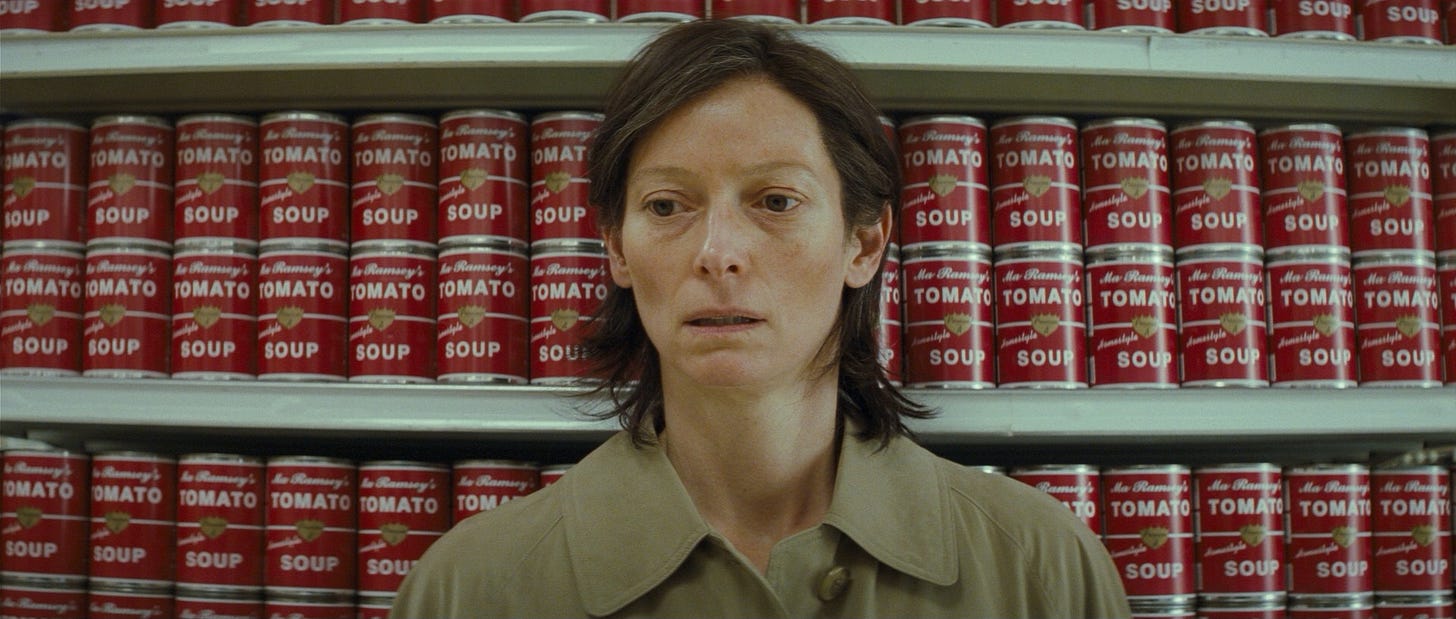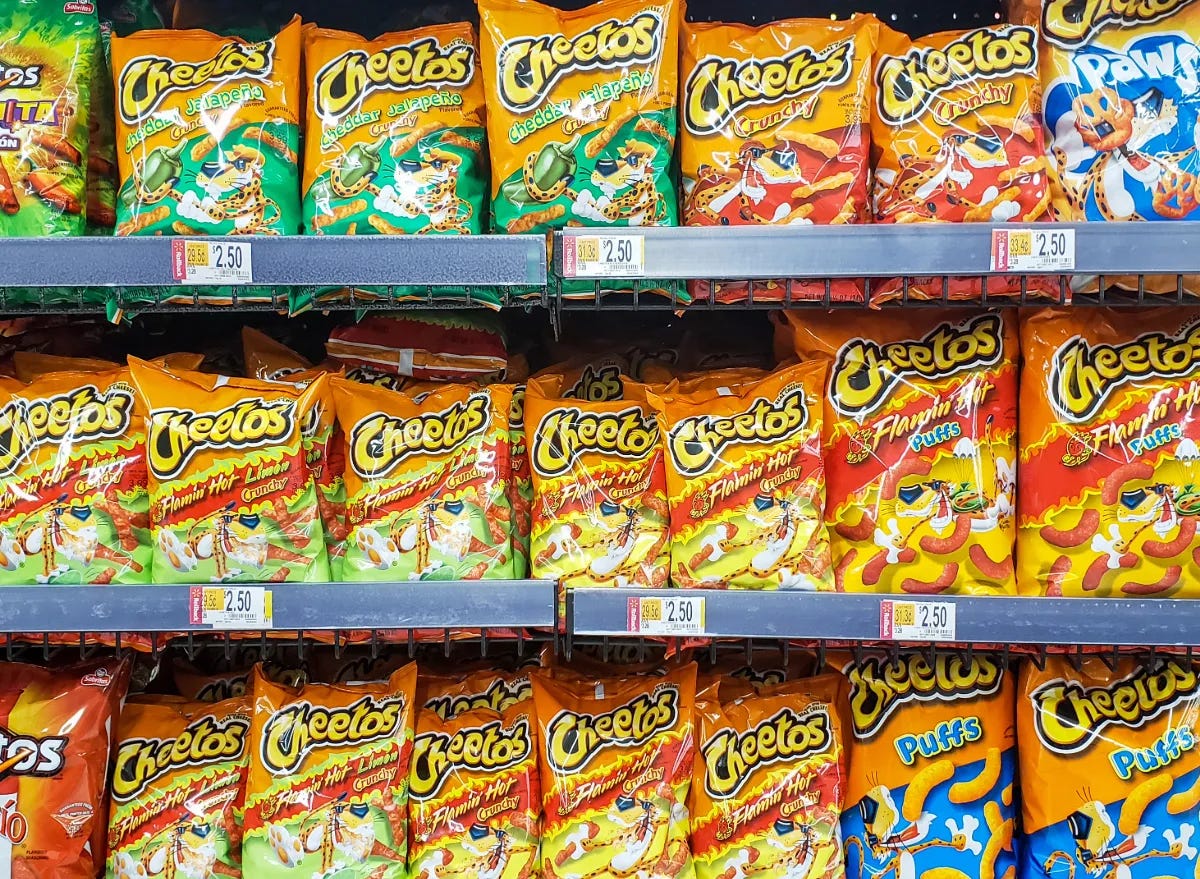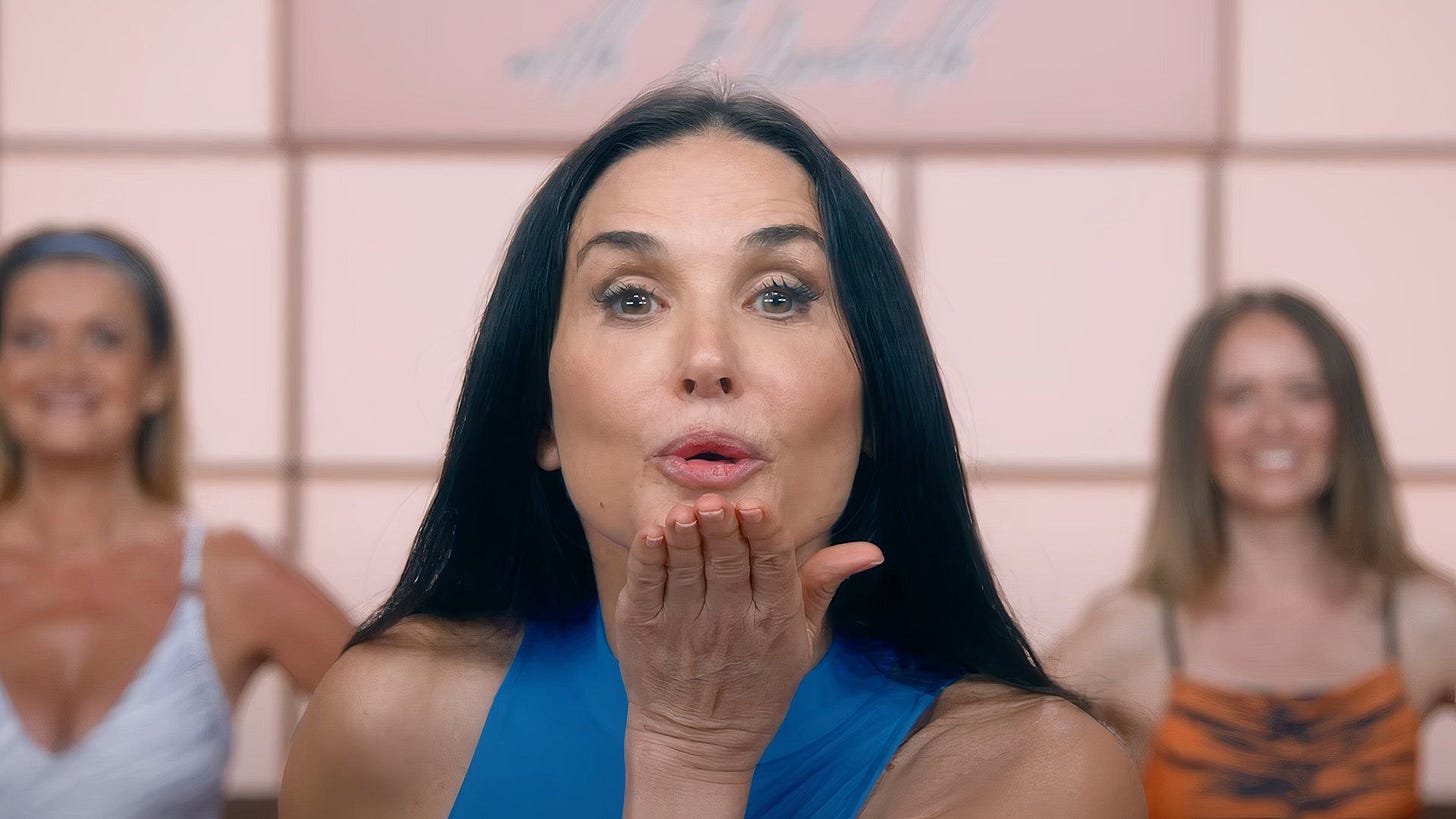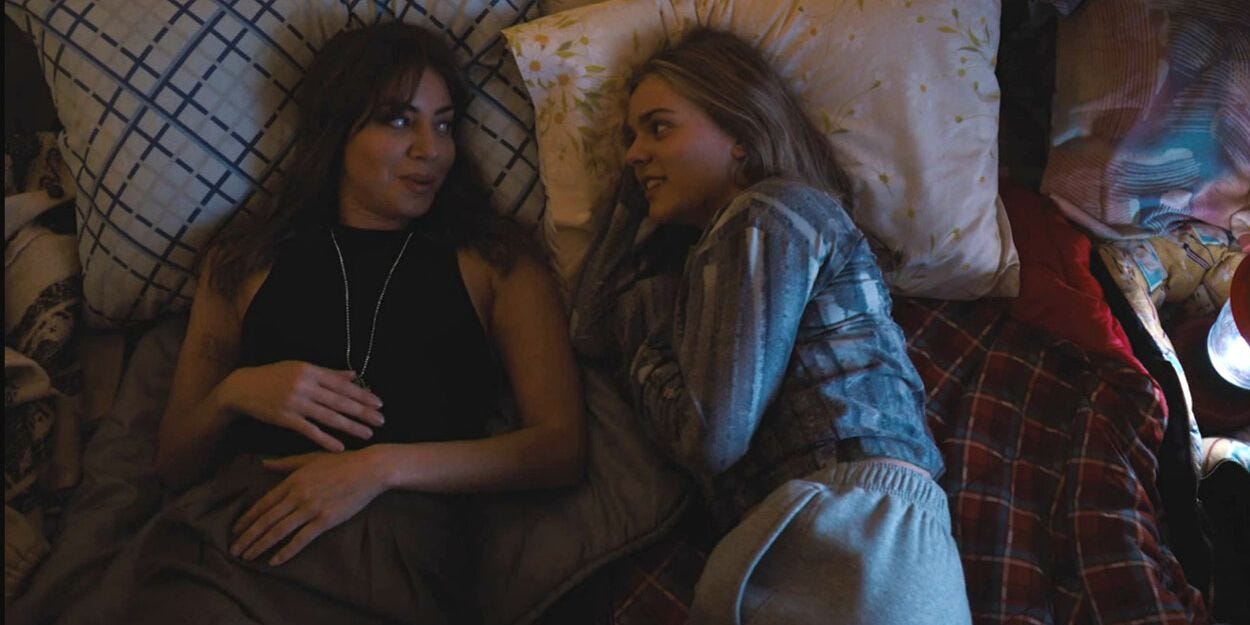The "C" Word
It's offensive. It's reductive. It needs to die. Plus: Thoughts on "The Substance"
“In practical terms, ‘content creator’ neatly accomplishes two things at once: It lets people who make garbage think they’re making art, and tells people who make art that they’re making garbage.” - Jason Bailey
Imagine with me… one morning, you wake up and open the fridge, only to realize you’re out of eggs. So off you go to the grocery store. As you stroll in, a friendly stranger approaches and pops a Cheeto into your mouth.
The nerve! Nevertheless, you munch. Mm. Tasty. Another stranger approaches with another Cheeto. You gobble it up. Then 50 more surround you.
You stagger home, mouth crusted with neon orange powder, armed with a complimentary six month supply of Cheetos. For breakfast, lunch, and dinner, you do delicious, flamin’ hot violence to your digestive tract. Your taste buds sing, your blood sugar screams, and you never have to cook or leave the house.
Six months later, you finish the Cheetos, and decide you’d better go get those eggs, and maybe some fresh produce as well. Fatigued, irritable, and vitamin depleted, you waddle to the grocery store. But something is different…
The produce section is gone. In its place are produce-flavored Cheetos. The eggs have been replaced by egg-shaped Cheetos. The shelves are teeming with Cheetos of all persuasions, and nothing more.
… I know, I know. Absurd, right? We’d never replace our entire diet with Cheetos. But when it comes to our media diet, this is exactly what we’ve done.
The term "content" gained prominence with the rise of the internet in the early 2000s. It originated with tech companies, where “content” referred to editable and dynamic parts of a web page. When Web 2.0 - the “social web” - emerged, the word expanded to encompass user-generated videos on new platforms like YouTube.
Wall Street financiers quickly embraced the term, using it on spreadsheets as a cost category. Content became a convenient catch-all for various forms of media created for the growing number of distribution platforms. By the dawn of the streaming era (around 2007), the word had metastasized into the broader culture, applied indiscriminately to all audiovisual media, from arthouse films to multiplex blockbusters, from prestige miniseries on HBO to plumbing videos on Facebook.
Most of us have adopted the term without hesitation. But some, particularly artists and filmmakers, have pushed back.
“To hear people talk about ‘content’ makes me feel like the stuffing inside a sofa cushion,” Oscar-winning actor and screenwriter Emma Thompson quipped at the Royal Television Society conference last year. “It’s just a rude word for creative people… you don’t want to hear your stories described as ‘content’ or your acting or your producing described as ‘content.’ That’s just like coffee grounds in the sink or something.”
You may be asking: Why should we care if a celebrity has a quibble over semantics? The world changes, and language evolves. Technology has ushered in a multiscreen landscape where the line between movies, TV, online videos, and video games continues to blur. Don’t we need new terms to describe this?
Perhaps. But let’s consider some other linguistic changes Wall Street has embraced in recent years - and their darker implications.
Take, for example, healthcare, where private equity stakeholders have rebranded physicians as “providers.” This isn’t an innocent or useful change; in fact, it’s a tactic that originated with the Nazis, who changed the title of Jewish doctors from Arzt (doctor) to Behandler (provider) in order to dehumanize them.
Nowadays, it’s part of a larger corporate devaluing strategy to drive down costs and boost profits, intended to sever skill, craft, and dignity from the profession by reducing doctors to fungible commodities. While profits soar on Wall Street, physician dissatisfaction and burnout have steadily increased, and the quality of our healthcare has been in free fall. The results have been fatal. The National Bureau of Economic Research estimates that private equity ownership has been responsible for 20,000 premature deaths over the last 12 years in the nursing home sector alone.
In aviation, the relentless pursuit of short-term shareholder gains is putting passengers’ lives at risk, as pilots - many of whom have been downgraded from full-time to precarious contract positions - along with other overworked employees, are pushed to their breaking points.
The rot has spread to every sector that can be commodified: apartment buildings, emergency services, even prisons. Yet, thanks to legal loopholes, private equity firms have shielded themselves from any responsibility. And without government intervention and consumer backlash, the industries we rely on will continue to be stripped down and sold for parts.
The financialization of Hollywood began long ago - in the wake of an antitrust decision, ironically enough. After the 1948 Paramount Decree, which forbade studios from owning the theaters that exhibited the films they produced, investment bankers gradually encroached on the studios through a series of corporate mergers and hostile takeovers. From the mid-60s through most of the 70s, creatives and bankers maintained a fraught but steadily profitable alliance - a golden age known as New Hollywood. But with the birth of the blockbuster and its lucrative merchandising potential, investment capital saw green - and seized total control.
In the decades since, the decline of home video sales, advancement of streaming analytics, dwindling foreign presales and further consolidation have only strengthened Wall Street’s grip, crushing smaller studios and transforming others into bland, homogenizing content mills.
“Martin Scorsese and Logan Paul are not in the same line of work,” wrote film critic Jason Bailey last year. “In practical terms, ‘content creator’ neatly accomplishes two things at once: It lets people who make garbage think they’re making art, and tells people who make art that they’re making garbage.”
The term content is undeniably useful. I enjoy funny cat videos as much as the next person, just like I enjoy the occasional Cheeto. There’s a place in our media diet for content. But when we apply the term universally, it becomes pernicious. By flattening art and entertainment (and healthcare, and aviation, etc) into disposable commodities, the management class seeks to lower our standards for goods and services, while slashing the rates of those who provide them. It’s a slash-and-burn mentality that threatens us all.
“These paradigm shifts require more clarity in our language, not less.” - Jason Bailey
I won’t lie - there are moments when the “contentification” of our culture makes me want to smash that like button (to pieces) and unsubscribe from society. But what we stand to lose is too valuable. And increasingly, more people are revolting.
Just last weekend, comedian John Mulaney was invited to perform at Dreamforce, an AI convention in San Francisco. He seized the opportunity to brutally torch the industry: “If AI is truly smarter than us and tells us [humans] should die, then I think we should die. So many of you feel imminently replaceable,” he deadpanned to a horrified audience of 45,000 fleece-vested tech bros. “You’re hosting a ‘future of AI’ event in a city that has failed humanity so miserably??”
Our culture industries need a reboot. We need to boot the suits out of the creative process, and start calling art art again, movies movies again, and not content. I realize that many won’t appreciate the distinction. “The film business is a business. Revenue is all that matters,” I can hear them muttering. There’s a “c” word for these people - cynics - those who know the price of everything, and the value of nothing (as a famous “content creator” named Oscar Wilde once said).
To hell with the ruthless bean-counting and insatiable greed. Tremendous value exists outside the cells of a spreadsheet. Not everything that counts can be counted, and not everything that can be counted counts.
Has the streaming era brought us some great films and TV shows from around the world? Absolutely. That’s why it’s so frustrating when these conglomerates seem to stifle their own success. The pursuit of profit above all else, coupled with a corporate aversion to risk, has degraded our media diet, depriving us of meaningful stories that move and challenge us in favor of vapid, I.P.-driven franchises that numb and infantilize us. “I do believe no slump was ever broken without a willingness to take risks,” Baby Reindeer creator Richard Gadd said when winning the Emmy last week. “I think if Baby Reindeer has proved anything, it’s that there’s no set formula to this. That you don’t need big stars, proven IP, long-running series, catch-all storytelling to have a hit.”
The less quality we demand as consumers, the less quality they need to deliver. It is also destroying the livelihoods of creatives, and with it, the future of the industry itself.
The good news is that we still have a voice, and we can use it to demand better. If we do, there’s a real chance the private equity overlords might loosen their grip on creative control, just as the struggling studios once did, allowing directors like Spielberg, Lucas, and Scorsese to usher in an era of renewed artistic vitality and profitability. A New New Hollywood is within reach, and it’s ours for the taking. All we need is that other “c” word - courage - to speak up and seize it.
The Substance (2024)
“Soo there is life as you know it before watching THE SUBSTANCE and life as you know it after watching THE SUBSTANCE,” A.V. Club writer Saloni Gajjar tweeted this week. After watching The Substance, I am inclined to agree.
Although Coralie Fargeat’s divisive body horror flick is getting considerable buzz (detractors might say it’s “overexposed”), I couldn’t resist featuring it as this week’s Underexposed Movie Pick, as it is so fully emblematic of what I wish to celebrate here - movies that are boldly authored, challenging, and unforgettable. In today’s sanitized, corporatized landscape, it’s almost unthinkable to see a movie this raw, iconoclastic, and brutally honest in theaters - where I strongly recommend you experience it, if you dare. This one isn’t for the faint of heart, but it has vital things to say about unattainable beauty standards and the self-destructive behaviors we adopt to achieve them.
Demi Moore stars as Elisabeth Sparkle, an aging actress ousted from her role as a TV fitness instructor by her unctuous producer (Dennis Quaid). She discovers a mysterious product called “The Substance,” which allows her to create a younger version of herself (Margaret Qualley) and reclaim the spotlight. But there are strict rules and unforeseen consequences that soon spiral out of control.
I believe a primary purpose of art is to hold a mirror up to society, reflecting even its ugliest parts back at us so we can truly see them. “They couldn’t make that movie today,” people love to say these days, maybe a little too eagerly. Well, they made The Substance - and like it or hate it, we should be happy they did, and hopeful that more bold visions find their way to our biggest screens. Darkly funny, wildly unpredictable, and disturbing in all the right ways, it’s a film that’s as timely as it is provocative.
Where To Watch The Substance
Currently playing in theaters. Remember those?
News Reel
What advice would you give to your younger self? Would you spoil life’s surprises if it meant sparing yourself from traumatic (but maybe necessary) lessons? These are the questions at the heart of Megan Park’s wildly absurd and unexpectedly touching dramedy My Old Ass, hitting theaters nationwide this weekend. The film follows Elliott (Maisy Stella), a college-bound teen soaking up her last summer at home, when life takes a surreal turn - her 39-year-old self (Aubrey Plaza) appears during a mushroom trip gone wrong. Old Elliot attempts to guide Young Elliott toward what matters most in life, but it could be they both have something to teach each other. This is easily one of the year’s standout films, and the only reason it’s not featured more prominently is because it deserves a full write-up in the Fridays ahead. But if you catch just one movie in theaters this weekend, make it My Old Ass. Fandang-go get those tickets now.
Have you read the hot new book “Summary If the Woman in Me: A Guide to Britney Spears Memoir” by Sula Urbanr? Hopefully not - it’s one of thousands of AI-generated titles polluting Amazon right now, preventing you from finding phenomenal new human books, like this one. Max Read reports on “slop,” the deluge of AI-generated content that has infiltrated Google searches and social media feeds in the past few years, with occasionally hilarious and sometimes dangerous results. Save us, Shrimp Jesus!
Deadline reports that Netflix is moving into a “real adjustment phase” towards a new payment model for creatives and increased transparency. Streamers are great partners for ambitious filmmakers when they want to be. Let’s make the future brighter and more sustainable for everyone.
The Justice Department sued Visa this week, accusing the credit card company of monopolizing. Why do I care, you ask? Because stricter enforcement of antitrust laws is a crucial step toward creating a healthier and more competitive film landscape.
One More Fun Thing
Gene Kelly dancing with his shadow in Cover Girl (1944) is utterly delightful.
That’s it for this week’s Underexposed. Paid subscribers will be receiving a separate special bonus mystery edition in the coming days, so look out for that. Free subscribers, thank you for reading. If you’re enjoying my “content” and want to support my efforts, consider upgrading - you’ll gain full access to the archives, bonus articles and videos, and other perks.
See you next Friday,
Alex





"Film will only become art when it's materials are as inexpensive as pencil and paper." Jean Cocteau
Discuss.
"The less quality we demand as consumers..."
Ugh, good article but why'd you have to use the other c-word?